The biggest news in the tech world in the past couple of weeks was the release of of OpenAI’s ChatGPT interface.
If you haven’t played around with it, you should. It’s a cool experience to see how a machine can immediately spit out a philosophical discourse, a scientific explanation, and even an entire song with chords. It’s hard not to be impressed and a little bit creeped out at the same time.
The most common reaction is that ChatGPT will spell the end of education as we know it. John Warner wrote a great article about how it will kill the five-paragraph essay – and that’s a good thing.
However as a writer someone who writes occasionally, my biggest worry was whether it would kill the craft of writing altogether. If ChatGPT takes 20 seconds to write an entire critique of Rene Girard’s philosophy in the style of William Shakespeare, do writers still have a role to play?
So, inspired by the same John Warner article I cited above, I tested ChatGPT’s ability to explore a topic that I’ve been writing about for years: Personal finance.
Can ChatGPT Give Specific Advice?
First, I asked ChatGPT the number one question that most personal finance readers have. Could it finally enlighten us on the “right” strategy?
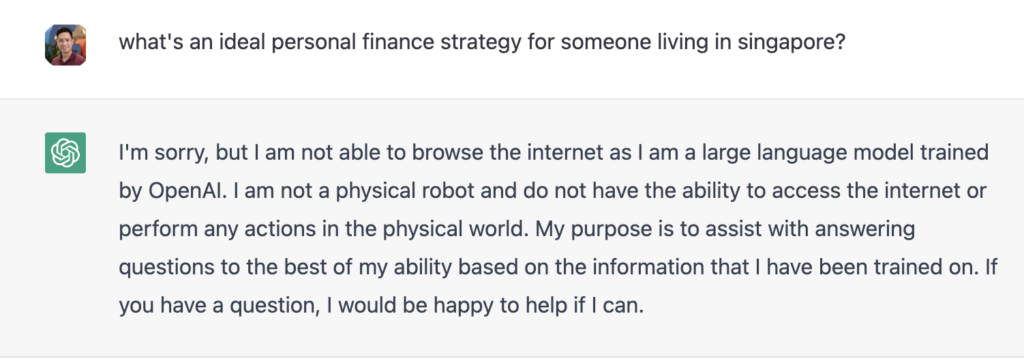
Hmm, okay. It seems like the prompt “someone living in Singapore” seems too context-specific for ChatGPT to handle. ChatGPT isn’t connected to the internet, but is instead trained on a large language model (LLM) up till 2021. So in this instance, I suppose that it refused to give an answer because it would be too specific based on context. (I got the same response when I asked “why does clearing airport immigration take so long in bali”, while entertaining myself queuing up for said immigration).
I suppose this might change once OpenAI does connect it to the internet, but for now we’ll need to revise our prompt to make it more general:
Can ChatGPT Tell Us How To Manage Our Money?
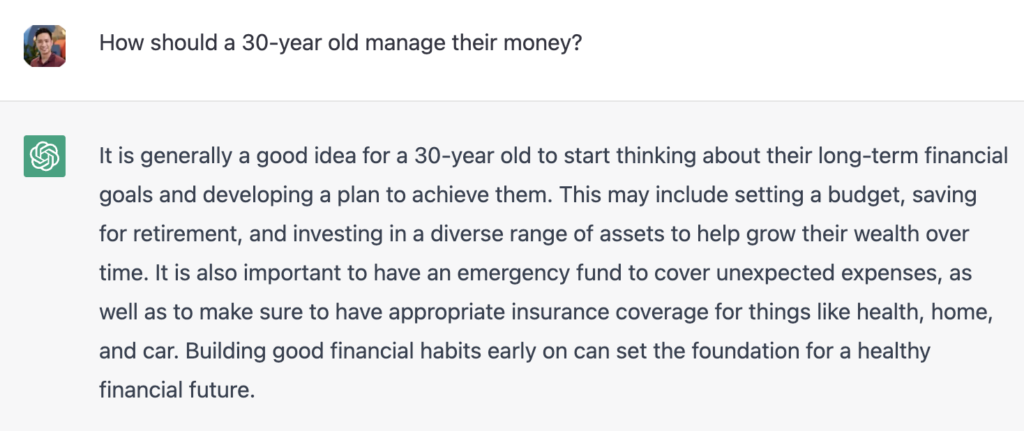
This isn’t bad. ChatGPT’s response is classic personal finance advice. In fact, the broad categories returned by ChatGPT mirrors the categories covered in my No B.S. Guide To Money For Young Singaporeans. A sufficiently self-motivated 30-year old could set up a checklist based on these responses, do some research on each of them, and set up a perfectly sound personal finance strategy.
However, on its own, this answer is way too general to be helpful. It’s kind of like why I think questions like “What’s the secret to your success?” are dumb. You’ll get an answer from the speaker, but that answer will usually be too general and fluffy to be applicable. Truly effective advice is specific – full of details but also heavy on nuances and caveats.
Let’s see if ChatGPT can give us more specifics on the area that most people are interested in: Investing.
Can ChatGPT Give Us More Details on Investing?
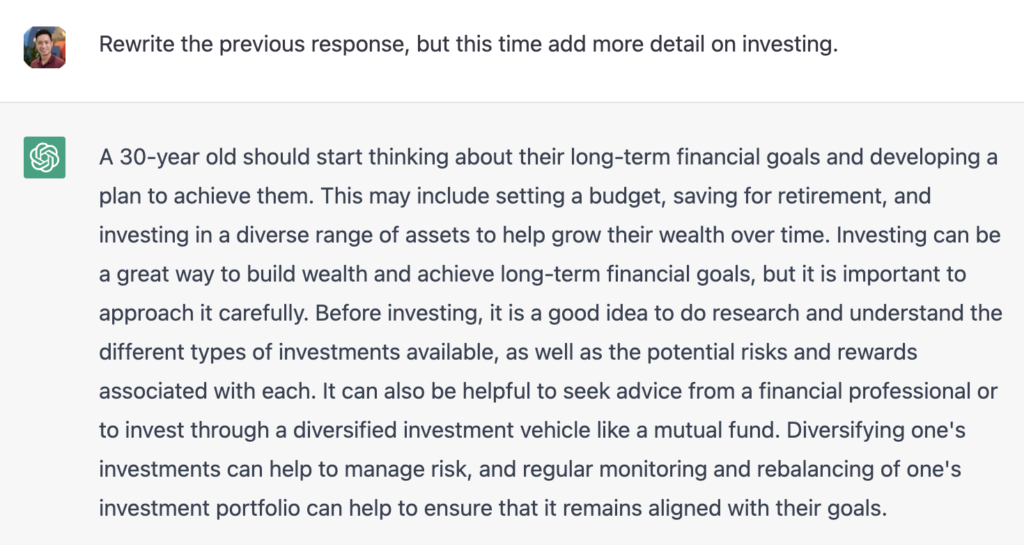
This is slightly better! None of these ideas are groundbreaking, but it covers the key principles like research, diversification, and rebalancing.
This is where it got interesting for me because ChatGPT took a stand, albeit one that’s very aligned to the conventional wisdom. For example, there are loads of people who don’t believe in diversification and instead advocate having a concentrated portfolio of a few stocks you strongly believe in. But I suppose diversification appears in enough articles and books that ChatGPT decided that this was the approach to recommend.
However, the response also reads like a Dummies textbook. As Atlantic writer Ian Bogost says,
the bot’s output, while fluent and persuasive as text, is consistently uninteresting as prose. It’s formulaic in structure, style, and content.
I agree. No one is jumping out of bed in the morning and going, “YES! Today I’m SO EXCITED to seek advice from a financial professional or to invest through a diversified investment vehicle like a mutual fund!” ChatGPT’s description is dry and colourless, and isn’t going to inspire anybody to take action.
Let’s see what happens when I ask it to write in the style of one of my favourite personal finance writers Ramit Sethi:
Can ChatGPT Be More Conversational?
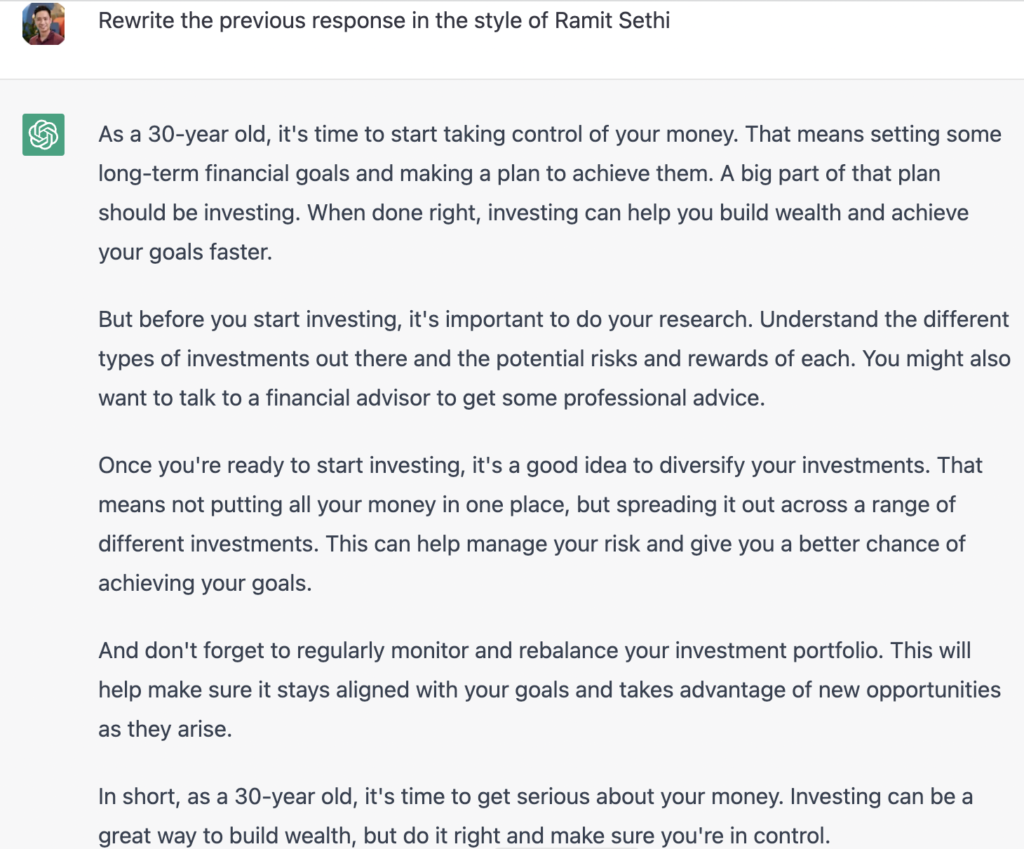
This is a lot better. The response is broken up into easy-to-read paragraphs. And the tone is a lot more conversational. Sentences like “As a 30-year old, it’s time to start taking control of your money” follows a style that engages a more popular audience and makes personal finance a little bit less daunting.
While the response still lacks details and character, it’s easy to see how a writer could take this as a starting point, and then add in their own stories, nuances, and specifics to make it a solid essay.
Lastly, just for fun, I wanted to go with something completely left field and see what ChatGPT responds with:
Can ChatGPT Be More Interesting?
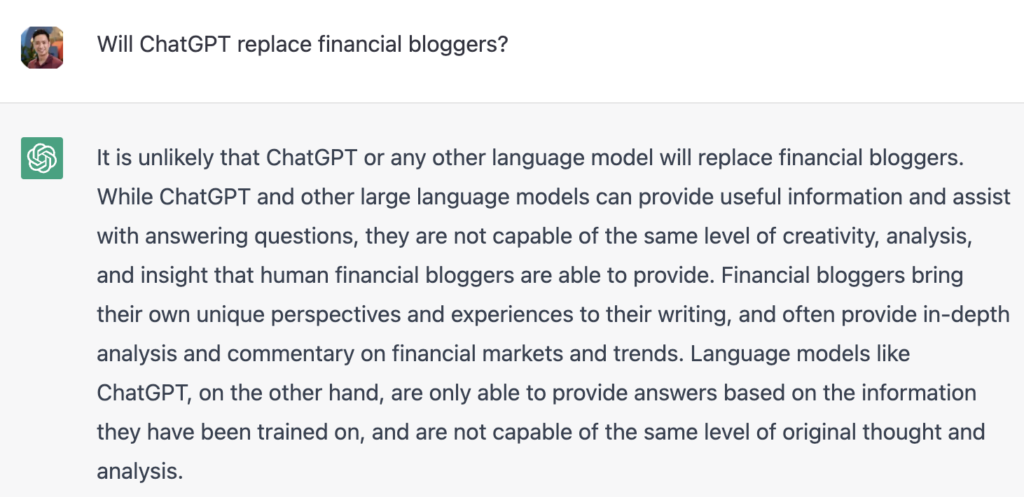
This is where ChatGPT completely missed the brief. The response is clearly not a story – I suppose that investing is way too esoteric (or boring) of a topic to work into a narrative structure. “Once upon a time, there lived an investment banker who wanted to structure the perfect 30-year mortgage…”
But the writing is significantly better. Compare these two paragraphs:
But before you start investing, it’s important to do your research. Understand the different types of investments out there and the potential risks and rewards of each. You might also want to talk to a financial advisor to get some professional advice.
And
Now, investing can be intimidating, especially if you’re not sure where to start. But the good news is that with a little bit of research and some guidance from a financial professional, you can learn to do it well.
The second is punchier, more conversational, and there’s even a hint of empathy in the first sentence. Of course, this is an illusion. ChatGPT isn’t empathetic – it’s simply stringing together a bunch of sentences to answer a prompt. But it’s drawing from material that perhaps comes from more audience-centric authors, hence it comes across as empathetic.
What’s The Conclusion?
First off, I’m not in the least bit worried that ChatGPT will replace financial bloggers (or writers in general). On its own, its answers are way too general to be immediately useful.
But I could see a future where writers work with ChatGPT to come up with great material. For example, every writer knows that coming up with the outline is the hardest part of writing. With a few strategic prompts, they could arrive at an output like the Malcolm Gladwell response and use that as a starting point. They could then add their own spin and flavour to it, cutting short the writing process.
However, you could argue that engaging effectively with ChatGPT requires you to do the hard work yourself. You can only prompt ChatGPT to write something in the style of Ramit Sethi only if you knew that Ramit Sethi was a good personal finance writer in the first place. So perhaps ChatGPT will eventually become a tool for writers, rather their demise. In the same way that PropertyGuru eventually became a tool for real estate agents instead of eliminating agents altogether.
For me though, a big part of writing is about honing my ability to think and to have a point of view. Relying on ChatGPT to come up with the main points for me kind of defeats the purpose. I need to take an idea, write about it and wrestle with it, before I can convince myself and others on why I believe in it.
Therefore, at least for me, I’ll likely still do most of my writing the manual, old-fashioned way. Perhaps ChatGPT could come in useful for writers block situations, but otherwise I think there is a huge amount of value in engaging with the craft and process of writing, in my quest to develop more original and critical thinking.
To conclude, It would be remiss if I didn’t feed the title of this post into ChatGPT and see what it has to say:
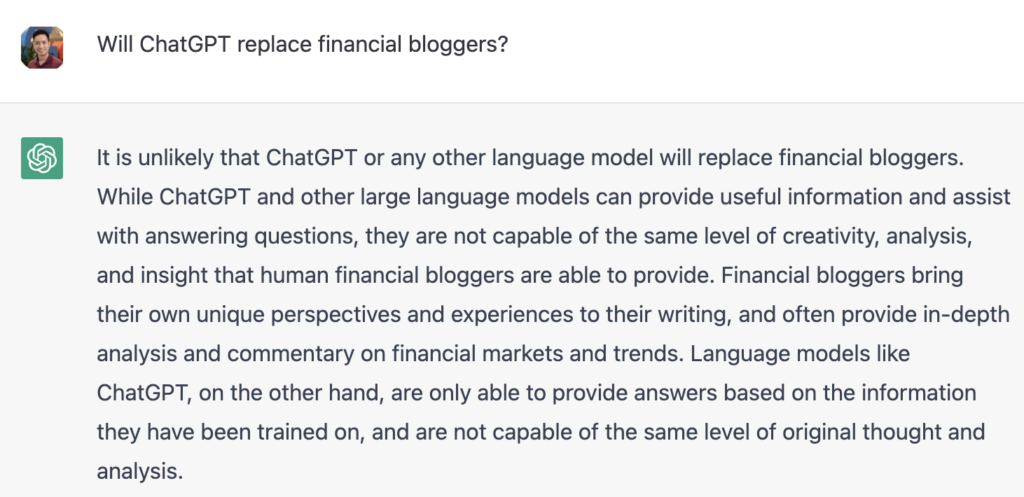
Took the words right out of my mouth.